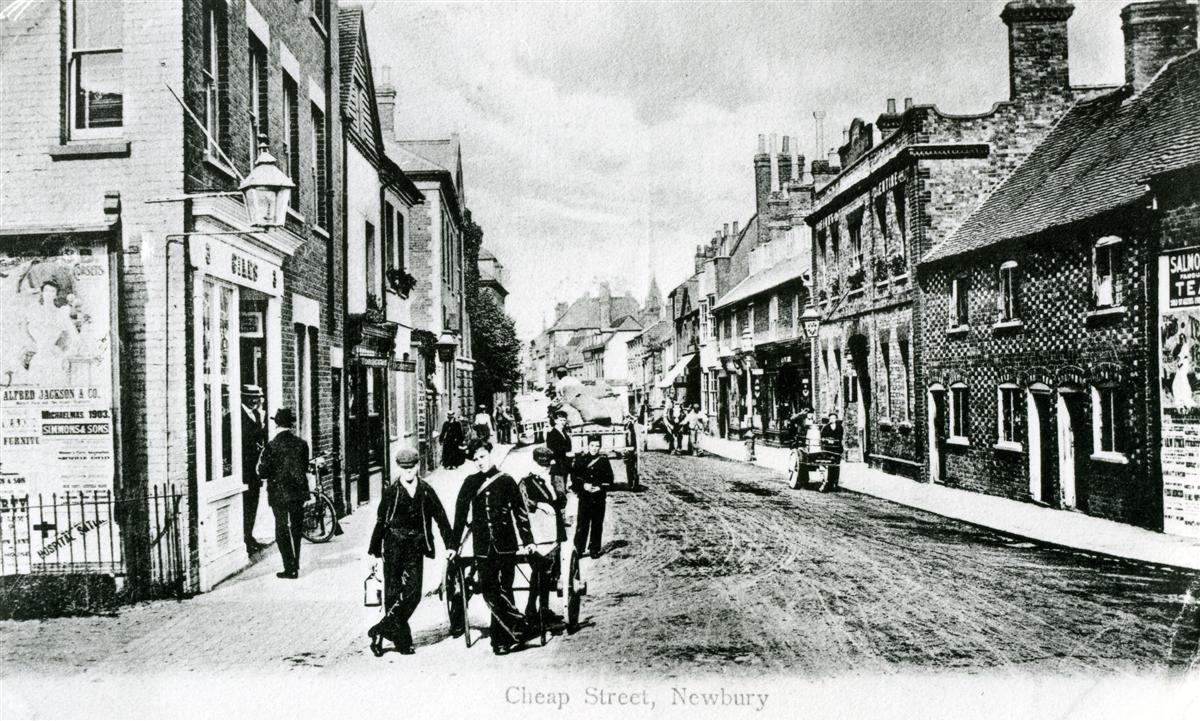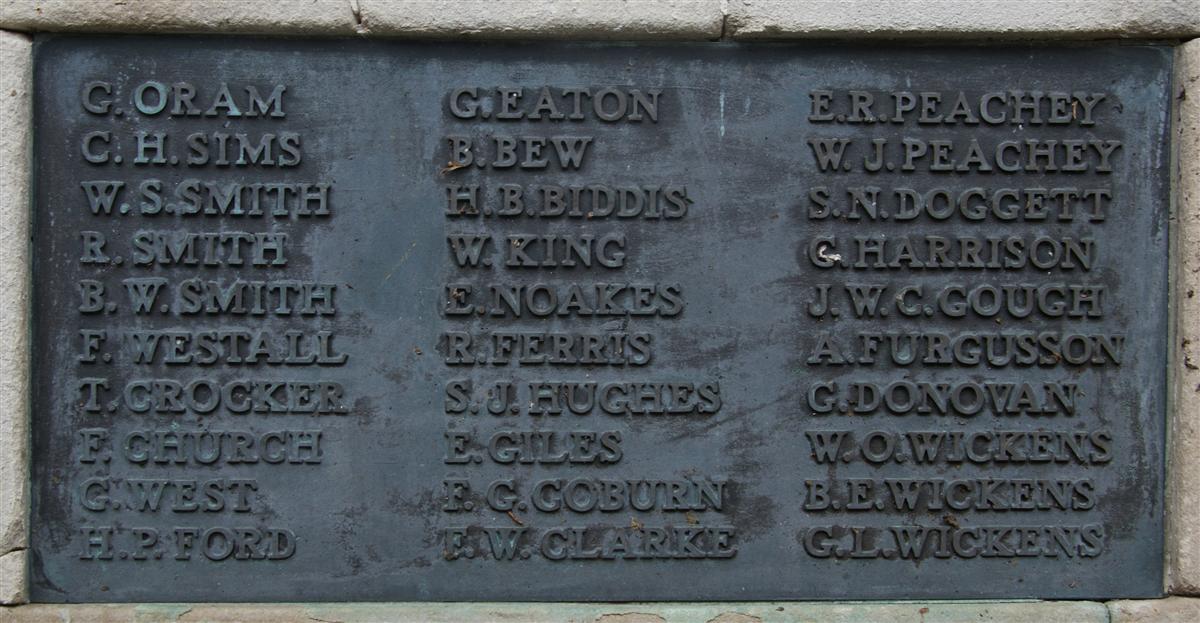John William Charles Gough
Private 26236 John William Charles Gough, 5th Battalion, Duke of Wellington’s (West Riding) Regiment.
Charlie was born in Newbury on Christmas Day 1891, the son of Charles Beaufoy Gough and his wife Alice Elizabeth (née Banning). He was the eldest of their four children, the others being Samuel George (born 28 Aug 1893), Thomas (11 Mar 1895) and Rose Alice (10 Jul 1897). He was educated at St John’s infants and St Nicolas’ School in Enborne Road leaving to become a Gordon Boy on 22 December 1905.

Gordon Boys in Cheap Street ca1910. |
On 20 November 1915 he married Rose Annie Dixon in the parish church at Hamstead Marshall. The following year the Government introduced conscription meaning that Charles would be automatically be deemed to have enlisted on 2 March and would, in time, be issued with call-up papers instructing him to report for a medical and, if passed fit, for subsequent service.
It was possible to appeal against conscription on a variety of grounds, while successful appeals were not that common the Newbury Tribunal would often grant a month or two’s reprieve to give the appellant a chance to put their affairs in order or for their employer (many appeals were by employers) time to find a replacement. SOUTH BERKS PIC+
The only surviving records of such appeals in Newbury are in the pages of the local papers, which did not report when his case came up at the Newbury Tribunal, but did record the failure of his appeal to the County Tribunal:
Newbury Weekly News, 6 April 1916 – County Tribunal
J W C Gough, bottling foreman and the South Berks Brewery, appealed on the grounds that his father was a helpless invalid, and he had two brothers serving in France. He did not appear. – Appeal dismissed.

South Berks Brewery advertisement - extra strong ale 1s 8d a gallon (that's 8p in today's coinage). |
So, on 22 April 1916, Charles reported at Brock Barracks in Reading for a medical, which found him to be ½ inch under height (he was only 5ft 1½ins tall) and suffering from flat feet. At another time he would have been rejected but these were not normal times and he was taken on by the Royal Berkshire Regiment (No 22610). Evidently he was not thought fit for the trenches and was posted to the regiment’s 10th (Labour) Battalion.
As he was not being sent to fight he had little need for training, before he had been in the Army for two months he was shipped over to France (on the night of 19/20 June 1916) when the whole battalion crossed the Channel.
Four months later, on 21 October, Rose gave birth to their daughter, Kathleen Edith Rosalie.
In January 1917 the Labour Corps was established, gradually taking over the various labour battalions created by many infantry regiments including the 10th Royal Berks. So, on 13 May 1917, Charles became Private 94383 in the Labour Corps. That day the 10th Royal Berks was split into two Labour Corps companies, 158 and 159 – Charles moving to the former.
During its time in France the 10th Battalion was based in Rouen (No 3 Labour Camp) providing labour to the supply chain to the Front. Supplies arrived by boat, were stored in depots and then distributed by rail - a lot of manpower was needed to ensure this system worked efficiently. The 158th Company continued with this work until July when it was transferred as support troops to XIV Corps. From this point the men would often be working in the defensive lines and battlezone – often within reach of enemy shellfire.
John Chapman summarises the Company’s war:
They became part of 15 Group of the Labour Corps working mainly in the Rouen area, based at Grand Quevilly from the 13th January 1917. Their duties revolved around the port, the Base Supply Depot, the Petrol Depot, the Ammunition wharf and timber work. They worked two shifts, from 07:00 to 18:00 and 18:00 to 05:00.
They gained two significant commendations - on the night of 5/6th June 1917 they unloaded 100 tons in 15 hours from SS Harbourne and then surpassed this with 300 tons off loaded in 2 hours from SS Alton on the night of the 4th/5th June.
On the 6th July 1917 they moved to the Straffem Railhead to join 32 Group within XIV Corps. The next day they moved on to Proven and then on the 10th to Ondank where they worked at the Royal Engineers dump.
They left XIV Corps on the 17th September moving to VIII Corps and then in quick succession to X Corps then XIX Corps.
[For this and many other articles covering the WW1 war service of the Royal Berkshire Regiment see John’s website].
Charles’ travels were not over, on 6 October 1917 he joined the 2/5th Battalion, Duke of Wellington's (West Riding Regiment), still a Private but with a new regimental number – 26236. Evidently the fitness standards for front line service had fallen, Charles’ arches had lifted, or he’d grown that extra half inch! Nevertheless, his medical records shows he had no problems related to his height or feet – his only issue was a dental abscess that was treated in October 1917.
In January 1918 he was given two weeks leave, plenty of time to get home and meet his daughter, by then over a year old.
He returned to his unit, which was a part of 186th Infantry Brigade, 62nd Division, in plenty of time for a somewhat delayed Christmas dinner! Rather oddly the men of the battalion were served the festive meal on 18 February – thanks to the generosity of the people of Huddersfield. The following month the 62nd Division was moved south from the Arras area to join IV Corps (Third Army) and take up positions near Achiet le Petit where, on 26 March, they first encountered the Germans advancing as part of Operation Michael, stage one of their Spring Offensive, or Kaiserslacht. After a few days of hard fighting (215 casualties) the fighting died down. Third Army’s defence proved more effective than that of Fifth Army to its south where the Germans made large gains. As Operation Michael ran out of steam the line stabilised once more and the focus of the fighting moved north and Operation Georgette, state two of the Spring Offensive. Replacements arrived and life for the 2/5th Duke of Wellington’s settled down again.
On 15 July the division moved south again, this time to become part of XXII Corps and, rather more unusually, a part of the Fifth French Army. The third stage of the Spring Offensive (Operation Blücher-Yorck) had fallen on French and UK troops along the Chemin des Dames in some cases hitting the same British Divisions that had faced the opening assaults of both of the previous offensives. After taking a lot of territory the Germans were stopped just short of Paris. The Germans tried again on 15 July east of Rheims, but the French (Fourth & Sixth Armies) were ready for them and the attack stalled on 17 July. The British (XXII Corps) and French rushed troops to the Front and counter-attacked on 18 July, on 20 July the 62nd Division was thrown into the attack. The Germans were gradually pushed back to their starting point before the fighting died down and the battle (2nd Battle of the Marne) officially ended on 8 August – the opening day of the Battle of Amiens 100 miles to the north-west, which (to British eyes) began the final defeat of Germany. The French argue, with some justification, that it was their defeat of the Germans in the 2nd Battle of the Marne that was the start of the end for Germany.

Charlie's name on Newbury War Memorial (centre) |
Locally he is remembered on Tablet 11 of the Newbury Town War Memorial and also on the Roll of Honour and Memorial Board in St Nicolas’ Church, Newbury.
He was not forgotten by his family:
Newbury Weekly News, 17 July 1919 – In Memoriam
GOUGH – In ever loving memory of my dear husband, Pte J W C Gough (Charlie), 62nd Div, West Riding Regt, who was reported killed in action July 20th, 1918.
Do not ask me if I miss him,
There is such a vacant place;
I shall never forget his footsteps,
Or his happy smiling face.
God knows how much I miss him,
He sees the tears I shed;
And whispers, Hush; He only sleeps,
Your loved one is not dead.
I cannot, Lord, thy purpose see,
But all is well that’s done by Thee.
For unknown to the world
He stands by my side
And whispers, dear wife
Do not fret – death cannot divide.
Saviour, in thy gracious keeping,
I leave my soldier daddy sleeping.
From his loving wife and little girl.
Newbury Weekly News, 24 July 1919 – In Memoriam
GOUGH - In ever loving memory of our dear boy, Pte J W C Gough (Charlie), 62nd Division West Riding Regiment, killed in action July 2oth, 1918. – Still to memory dear, from his loving mother, Dad, and brothers and sister.
Family
The newspaper report of his appeal against conscription mentions that his two brothers were already serving in France at the time (April 1916).
Samuel George, known as George, served with the Royal Engineers as a Driver (No 103131) and landed in France on 21 November 1915. A the time of enlistment on 19 June 1915 he gave his parents’ address (7 Sarum Cottages, Enborne Road) as his address, but changed this after he married Edith Anne Haines in St John’s Church, Caversham, on 27 October 1917. His new address became 10 Briants Avenue, Caversham. He was wounded on 25 August 1918 with an ankle wound described as ‘mild’ in his record. He was repatriated to England for treatment on 28 August and his war was over. By 1 February he was fit enough to proceed to Dispersal Station VII at Bedford for discharge – he was probably sent home within a day or two though his discharge did not become official until 3 March. He died in Reading in 1971 aged 77.
Thomas served with the Royal Berkshire Regiment as a Territorial (No 3916); it is unlikely, that he was a pre-war Territorial. His name was added to Newbury’s Active Service Roll in the week preceding 5 November 1914 – which matches with the enlistment dates of those with regimental numbers close to Thomas’. He crossed to France on 25 June 1916 on his way to join the 1/4th Battalion, Royal Berks in the field. He was not with his battalion for long before he was wounded – his wounding was reported in the Reading Observer on 26 August. However, his wound was not too serious and he returned to his battalion where he was given a new number (200906) when the Territorial Force was renumbered in 1916. He later transferred to the Royal Engineers as Pioneer 175734. He survived the war and died in the Wallingford area in 1958 aged 63.

Find a memorial :
| Died this day: | |
| 02 March 1918 | |
| Edward Jones | |
| Pangbourne |

Like this site? Show your appreciation through a donation to a great charity.